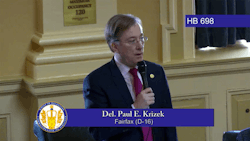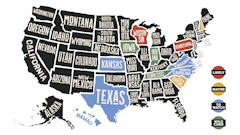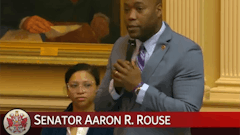
Virginia could allow licensed dispensaries to begin selling adult-use cannabis on May 1, 2025, but that decision is now up to a governor who hasn’t provided any enthusiasm for reform.
House and Senate lawmakers overcame their differences on competing measures Feb. 28, passing compromise legislation that paves a path for the Virginia Cannabis Control Authority (CCA) to open an applications process by Sept. 1, 2024, for a commercial adult-use market that will allow those 21 and older to purchase cannabis next year.
The legislation, sponsored by Del. Paul Krizek, D-Fairfax, and Sen. Aaron Rouse, D-Virginia Beach, passed almost entirely along party lines with a 51-47 vote in the House and a 21-18 vote in the Senate. Del. Joseph Obenshain and Sen. Christie New Craig were the lone Republicans to vote yes in their respective chambers.
“I’m happy to report that we are on the cusp of sending to the governor legislation that will create this commonwealth’s first retail marijuana market in a responsible and thoughtful way,” Krizek said before the House vote. “And we’ve done so because it’s time to give Virginia’s $3 billion illicit market a run for its money, and it’s time to give Virginians access to a safe, tested and taxed product.”
The General Assembly’s passage of this cannabis “sales” bill comes nearly three years after Virginia initially legalized adult-use cannabis. Former Democratic Gov. Ralph Northam signed legislation in April 2021, allowing adults 21 and older to possess up to 1 ounce of cannabis and grow up to four plants per household starting July 1 of that year.
But Democrats who controlled the General Assembly that legislative session wrote a reenactment clause for a commercial market into the bill, and that reenactment never materialized after Republicans took control of the Virginia House and governorship in 2022.
While Democrats regained control of the House in 2024—allowing them to push the current sales bill through—Republican Gov. Glenn Youngkin, who hasn’t offered optimism for nor interest in cannabis reform since taking office, still heads the state’s executive branch.
While Youngkin hasn’t threatened to veto the legislation, according to The Associated Press, he told reporters after his State of the Commonwealth address in January that “This is an area that I really don’t have any interest in.”
Youngkin’s press secretary, Christian Martinez, did not provide Cannabis Business Times with new insights this week but instead referred to the governor’s comments from after the address.
Youngkin doesn’t necessarily have to sign the legislation to allow it to become law. In April 2023, Delaware Democratic Gov. John Carney, who opposed legalization, allowed an adult-use bill to become law by neither signing nor vetoing it.
Should Youngkin do the same, those 21 and older would be allowed to purchase up to 2.5 ounces of cannabis, or an equivalent amount of a cannabis product, during a single transaction starting May 1, 2025, according to the bill.
That launch date for commercial sales—which veers from the original House bill’s earlier start date—was one of four key changes to the lower chamber’s version of the bill that was reconciled in negotiations with the Senate, Krizek said.
The other three changes revolved around cultivation canopy, equity and taxes:
- Instead of the House-proposed 9% excise tax on cannabis sales, the current legislation calls for an 11.625% excise tax comprised of an 8% state tax, a 2.5% local tax option, and a 1.125% sales-and-use tax to fund kindergarten through 12th grade education.
- The House adopted the Senate’s version for cultivation licenses as it relates to canopy structures, including five tiers with limits of 2,000, 10,000, 25,000, 45,000 and 70,000 square feet. CCA regulators would be allowed to adjust canopy sizes “if deemed appropriate,” according to the bill. There will be up to 50 licenses available for each of the first two tiers (2,000 and 10,000 square feet), up to 10 licenses for the third tier, up to five licenses for the fourth tier, and up to 10 licenses for the fifth tier. Outdoor cultivation would be limited to the first two licensing tiers.
- As it relates to equity, the final version of the bill aligns with the House proposal to have a microbusiness support program that will be funded, in part, by 75% of the licensing fees collected by the CCA from July 1, 2024, through July 1, 2025. Starting July 1, 2026, the program will be supported by 60% of the tax revenue from retail sales.
The remaining 40% of tax revenue would go toward funding pre-kindergarten programs (10%), substance-use disorder prevention and treatment programs (25%), and public health programs aimed at preventing drugged driving and underage consumption (10%), according to the bill.
“Also, there'll be licensed preferences for microbusinesses,” Krizek said. “These preferences, which will be race neutral, will offer significant economic opportunities for economically disadvantaged persons, including persons who have suffered hardship or loss due to this country’s war on marijuana.”
In order to qualify as a microbusiness license applicant, a company must be 66% owned and controlled by a person who meets the state’s social equity criteria, according to the bill.
Under the finalized legislation, no group of licensees will get a head start on the retail launch. The state’s existing medical cannabis operators could apply for up to five adult-use dispensary licenses that would have to be co-located with their medical stores, according to the bill.
While there are supposed to be five medical cannabis operators in Virginia, in reality there are only three companies serving the state’s qualified patients: Green Thumb Industries, Jushi Holdings and The Cannabist Co. (formerly Columbia Care), which operates two licenses following its 2021 acquisition of Green Leaf Medical. The fifth license, awarded to PharmaCann and acquired by MedMen, was rescinded with a possible reissuance held up in court.
The CCA would have the authority to license up to 350 adult-use cannabis stores, 100 processing facilities, and an unspecified number of testing facilities, in addition to the various license caps for the five cultivation tiers, according to the bill. Dispensaries would not be permitted to operate within 1,000 feet of one another.
Local municipalities would be allowed to opt out from hosting adult-use cannabis dispensaries in their jurisdictions, but only after the majority of voters pass a referendum to do so, according to the bill.
Del. Todd Gilbert, R-Shenandoah, Virginia’s former House Speaker, pushed back on the idea that legalizing adult-use sales in the commonwealth would help eradicate unlicensed activity.
“The idea that any of this is going to get rid of the black market is laughable, with all due respect,” Gilbert said before Wednesday’s floor vote. “In every state that’s legalized it, the black market is, if anything, much more robust, larger, more dominant in this marketplace, legal or illegal.”
Gilbert pointed to California, which he said “messed this up so bad” with onerous taxes and regulations that the state had to “bail out the retail marijuana marketplace” to the tune of $100 million.
Gilbert was referring to the state’s Local Jurisdiction Assistance Grant program, one-time grant funding to help cannabis businesses transition from provisional to annual licensure. What Gilbert did not mention was that the state’s cannabis industry has provided $5.8 billion in total state tax revenue since launching adult-use sales in 2018 and that 62% of Californians believe legalization has had a positive impact on their state.
Krizek said that he doubted any of Virginia’s lawmakers who support legalization would vote for the bill if they didn’t believe it could eradicate or put a “severe dent” in the unregulated market.
“The fact of the matter is that drug dealers don't ID; they're not checking for age,” he said. “Those products aren’t lab tested for purity or potency. They don't accurately label them, and they don't use childproof packaging. This bill mandates all of those things. And that's why we need to bring this into a regulatory framework that will protect our children and our commonwealth. And that’s what I'm trying to do here.”






















